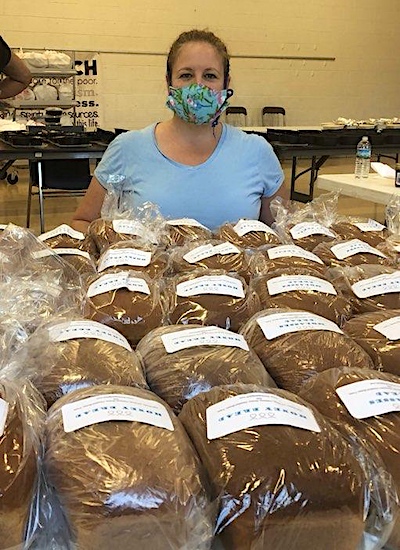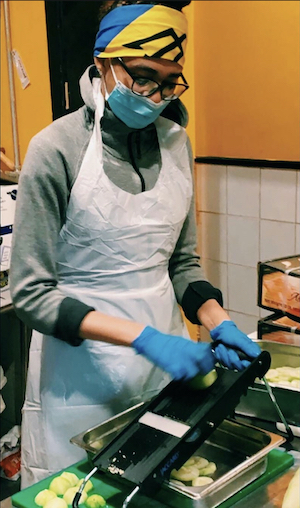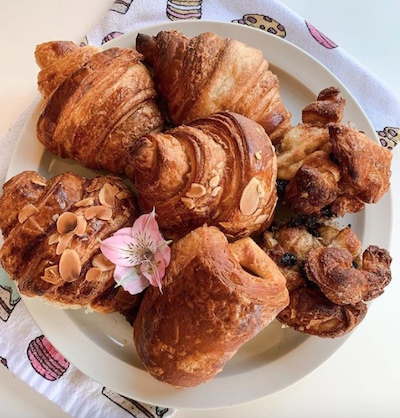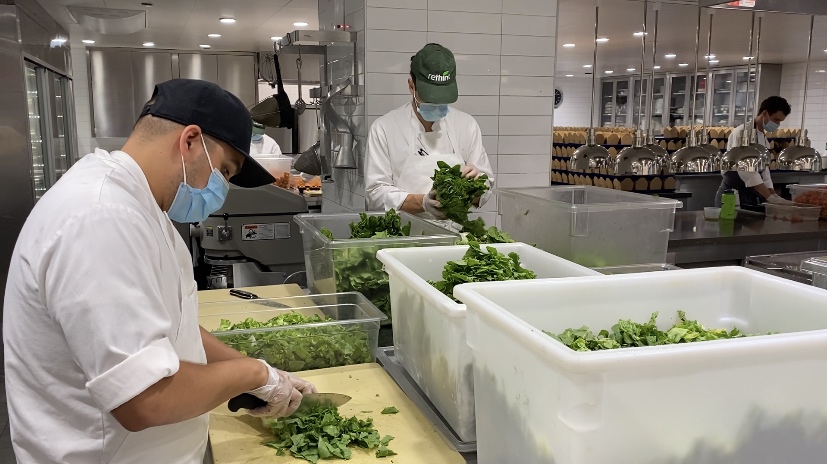The first half of 2020 has proven one of the most tumultuous times in modern history. With the intersection of the coronavirus pandemic and the Black Lives Matter movement, many people are finding any method of self-care to be a necessary priority in order to withstand the accompanying stress. For many ICE students and graduates, however, this moment was one to practice care more broadly, finding ways to put their culinary and food management skills to work to care for their communities.
Offering food has been seen as an act of love since the dawn of human history. It is a gift above all others for its potential to both bring joy and nourish those on the receiving end. When the many forces at play in 2020 created a particular need for food and resources, students and alumni applied this principle to prepare meals for frontline workers and the recently unemployed, provide better food access to traditionally marginalized communities and raise funds for social justice. Our community has repurposed an abundance of time, put themselves to work, and got a taste of how helping others helps us all.
 Bread for All: Jen Jensen (Pastry, ‘04)
Bread for All: Jen Jensen (Pastry, ‘04)
Like many chefs, Jen Jensen felt the immediate impact of the coronavirus as a call to arms: “I was passionate about helping feed the legions of people who lost their jobs and were suffering,” she says. “As I searched for a way to help, it became clear to me that if I stuck to what I was good at, I could find a way.”
Good at managing an ambitious baking regimen in her own kitchen, the Pastry Arts graduate operates a specialty cake business called Frosting n’ Glaze at her home in Hartford, Connecticut. While home cooks were making their first attempts at sourdough, Jen reported that she was “baking everything I could think of, especially bread.”
When a friend mentioned that a local community kitchen was still operating during the pandemic shutdown to provide meals to families in need, Jen knew that her efforts could be of use: “I reached out to the director of the program and on April 15, I donated 70 loaves of bread to feed families.” Jen continued to find other community programs that could benefit from her baking, eventually asking friends and family for help so she could keep funding supplies.
What began solely as an act of charity gained so much momentum and support from her community that Jen eventually coined her program “Bread for All” — for every loaf someone purchases from her, she makes one to donate on their behalf, a program she intends to keep up for as long as there’s a need. Someone who knew Jen through her teaching at Sur La Table wrote to King Arthur Flour about the program, and the company responded by sending Jen additional supplies. Throughout the spring and early summer, she made upwards of 750 loaves of bread to give to Hartford community programs, including Waste Not Want Not Kitchen, Night Angels, Fern Street Food Ministry’s Backpack Program and Bloomfield Community Kitchen.
“I do have concerns that as things ‘go back to normal’ people will assume the food insecurities have declined and there is no longer a need for food programs,” she says. “In reality, they need donations more than ever. My goal is to open a bakery where I can keep the same concept going: buy one, donate one. I would love to run a business that is truly part of my community, that helps my community the only way I know how to. By feeding them.”
 Empathy Palooza: Zakia Mack, Health-Supportive Culinary Arts Student
Empathy Palooza: Zakia Mack, Health-Supportive Culinary Arts Student
“It’s extremely humbling when you realize you’re doing something that’s bigger than you,” says Zakia Mack, an ICE student halfway through her program when the coronavirus hit.
She speaks of volunteering at Palooza Kitchen in Brooklyn, where owner Lesley Cadogan immediately pivoted his Caribbean restaurant to provide meals for frontline workers. Zakia knew Lesley from previously working as a bartender at his other restaurant and lounge, Brooklyn Prime. When he made the call for volunteers for his Palooza Kitchen operation, Zakia decided to get a head start in a professional kitchen while her program was on pause.
“It was an opportunity to be in the kitchen, it was a way for me to give back with everything that was going on, and it was a valuable way to spend my time,” Zakia says.
Lesley had two of his chefs doing the majority of the cooking, but everyone was grateful for any kind of help. “When I was in the kitchen, I was kind of the ‘peeling potatoes’ girl. They put me wherever they needed me. Because I’ve worked in service, I’ve seen the back of the house, but working back of house was really different. I was really grateful to watch chefs doing their thing.”
The program began with an intent to serve 100-200 meals daily and quickly jumped to more than 500 meals, giving Zakia opportunities to help with other organizational tasks such as packaging and coordinating with the delivery drivers.
While she still looks forward to finishing her studies and doing an externship in earnest, she credits the experience with providing such a positive introduction to back-of-house work: “There was really great energy,” Zakia says. “The level of pressure wasn’t there because it was a bigger cause. No one had to be there, and yet everyone showed up to do something in the name of someone else.”

Baking Against Racism: Bisma Akhtar (Pastry, ‘19)
Bisma Akhtar was busy putting her pastry skills to work at Ladurée, known for exquisite French macarons, when the restrictions on NYC eateries forced the bakery to reduce operations significantly, only able to continue employing management-level staff.
Like many newly unemployed restaurant workers, Bisma was wondering when the crisis would end so she could get back to pastry work when a different act of service presented itself: Bakers Against Racism, an offshoot of the broader Black Lives Matter movement.
“One of the food bloggers I follow had posted about it on Instagram, and I thought it was a good opportunity to do something good for BLM and practice pastry since it had been a while,” Bisma told me. “I needed something to do at home.”
Bakers Against Racism referred to itself as a Worldwide Virtual Bake Sale for about a week in mid-June, helping to organize and mobilize individual bakers toward selling their own pastries for proceeds that would go to support racial justice organizations of the bakers’ choosing. BAR helped get the word out for anyone who posted about their bake sale on Instagram.
“I thought a lot about what I should do,” Bisma says. “Croissants were what I wanted to practice, so I did croissants, cookies and monkey bread with scraps from the croissant dough.” (Anyone who remembers making croissants from scratch, whether in a pastry or culinary program, will understand that this was no small feat from a New York apartment kitchen.) As for charities, Bisma chose Campaign Zero for its mission to shape long-term change and Black Table Arts because she is passionate about supporting Black artists.
Through her own advertising efforts online and in her Sugar Hill neighborhood, support from BAR, plus a tireless eight days of baking and delivering orders, Bisma raised $500 to split between the two causes. And it turned out to be a valuable experience for her in more than one way.
“Mostly I would give credit to Black Lives Matter and Bakers Against Racism,” Bisma says. “It was really nice and felt like a really supported community and I got a few orders that way and met some very nice people.”
As for baking practice, “I think it helped me realize how much work goes into working alone and it helped me adjust to working efficiently in a small kitchen. I’ve never done an order that big from that small of a space, and it was worth it in the end.”
Rethinking His Externship: Connor Kalantari (Culinary, ‘20)
Connor Kalantari was partway through his externship at Misi in Brooklyn — ICE alum Missy Robbins’ Italian bistro known for an elegant, contemporary approach to handmade pasta — when the restaurant had to shut its doors with the rest of New York City.
In an ICE email he saw what seemed like an excellent opportunity on multiple levels: Rethink, a nonprofit organization that partners with restaurants and other foodservice operations to combat food insecurity, had recently partnered with Eleven Madison Park. In the space of a few days, three-Michelin-starred EMP had gone from serving tasting menus for about 100 guests per night, to serving upward of 1,500 packaged meals to those struggling with the impact of the pandemic.
Initially, Connor thought that EMP would get more volunteers than they needed but was pleased when his offer to show up was gratefully accepted and came with several bonuses: “Of course, I wanted to finish my externship hours somewhere, and coincidentally, the sous at Misi who was my supervisor started working at EMP as well. So I got to continue my externship with someone who was already supervising me but in a new context. And it was a bonus that I got to finish my hours to not only serve someone’s plate but to really help while getting to work somewhere like EMP.”

Connor echoed Zakia’s thoughts about how the atmosphere in that kind of kitchen changes when the end goal changes: “It was cool because the angle here is feeding people so it’s not competitive. Of course, it’s an intense environment because it’s still a fine-dining kitchen, but we’re helping people, so it’s not the same pressure of being in a Michelin-starred restaurant.”
Since he got started a little later than the EMP cooks who had been working there before the pandemic, Connor embraced the spirit that the EMP staff had already established of doing whatever needed to get done. “Pretty much everyone in there hops on wherever. It’s more team-oriented than station-focused. It’s about who needs a hand when. With so much volume, it’s more based on getting everything done in a good manner.”
As with all good externships, it came with a learning experience: “It hasn’t changed my ultimate goal to own a restaurant, but it opened my eyes that the restaurant industry has changed and is continually changing,” Connor says. “And it has opened my eyes to new formats — catering versus service-based, smaller kitchens for more spaced-out seating and generally thinking about the future.”
Read more about ICE alumni working with Rethink Food.
Fresh Produce, from Schools to the Street: Jazmin Johnson (Culinary, ‘20)
“This is exactly what I was already doing,” says Jazmin Johnson, who was no stranger to the plight of food insecurity before the pandemic. She had been working for Wellness in the Schools, an organization that partners with NYC schools to create healthier lunch programs and better educate students about healthy personal choices: “We work with kitchen staff, training them on knife skills since they’re working for the first time with fresh produce and doing labs with kids about eating a more plant-based diet and ‘eating the rainbow.’ The ‘clean your plate’ mentality is not working for this generation, so we’re giving them the tools to combat childhood obesity.”
So when schools abruptly halted in-person operations, along with restaurants and non-essential businesses, it’s no wonder that Jazmin was drawn to a community fridge initiative with similar goals that she saw taking off on Instagram.
Along with three other women of color and with support from the In Our Hearts organization, Jazmin helped to found The Barrio Fridge, a community refrigerator on E. 108th Street in East Harlem, that operates by the honor system of “take what you need, leave what you don’t.”
Food pantries in the area don’t often provide access to quality fresh produce. “When I first started, I thought it was like building an ecosystem,” Jazmin says. She approached restaurants and bakeries about donating their end-of-day overages, focusing mainly on fresh produce and wholesome bread options. “There was one bakery that wanted to give us doughnuts at the end of the day, which is great and I love doughnuts, but I had to think about what I want to inject back into the community when the goal is foods that heal.”
Even in its short existence, The Barrio Fridge has turned into “a living, breathing fridge,” she says. “I can check on the fridge four times a day, and every time there are completely different things.”
Not only is the fridge a community resource, but it helps to create community. On whether she gets to interact with those who come to find sustenance from the fridge: “Of course! That’s the fun part of it: getting to know our community and neighbors,” Jazmin says, sharing an example of a family that was able to enjoy some rescued mushrooms from the fridge and now cultivates them at their home to give back to the fridge.
“My goal is to feed people,” Jazmin says. “That’s what all of our goals as chefs are, and this is me being able to do that.”
Explore volunteer opportunities for ICE career students.






